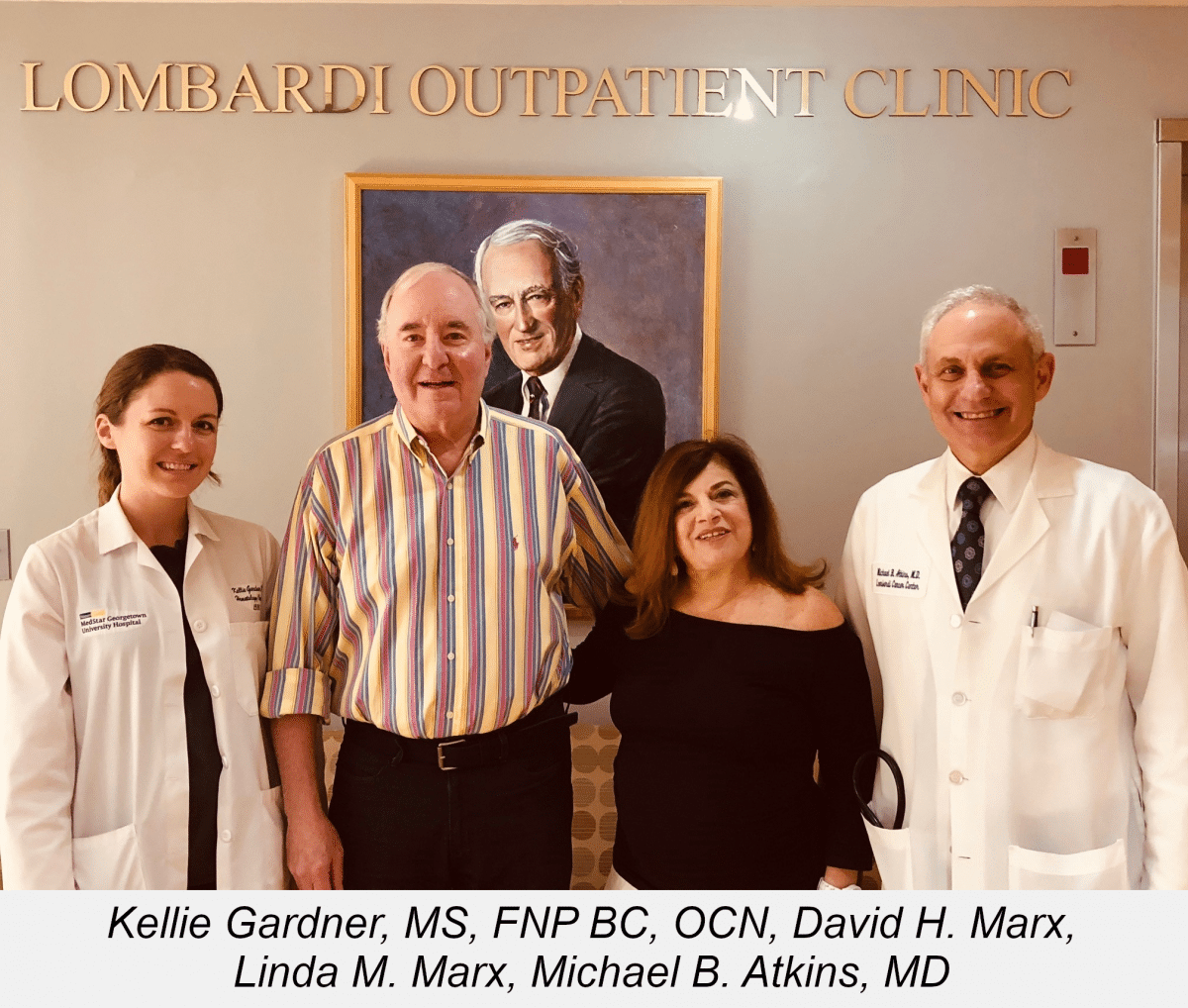Guest Blog: My Melanoma Experience

My Melanoma Experience
By David H. Marx
• ADVOCATE
• THE PERFECT NIGHT
• MY MELANOMA STORY BEGINS
• JOURNEY
• DIAGNOSIS
• GAME PLAN
• HOMEWORK: UNDERSTAND YOUR DIAGNOSIS
• ATTITUDE and POWERFUL EMOTIONS
• SURGERY
• TREATMENT
• AWARENESS
• COURAGE
• ATTITUDE IS EVERYTHING
A melanoma diagnosis can be a terrifying experience, but it does not have to be a lonely one. My wife was my ADVOCATE and the most important asset in dealing with my melanoma. Her instincts helped guide everything.
It all started with THE PERFECT NIGHT. Linda and I were out to dinner with two other couples that are special friends. The ambiance and food were terrific. We were toasting my retirement after 50 years as a Financial Advisor.
Little did I know that this perfect night would be when MY MELANOMA STORY BEGINS. After we got home from our celebration, I took my shoes and socks off and noticed that my hand was full of blood coming from the little toe on my left foot. The nail was cracked and bleeding. We stopped the bleeding and went to bed with the idea that we would go see Dr. Franklin Polun, a local podiatrist who had hours the next morning, a Saturday. As it turned out, he was on call at the nearby hospital doing rounds. His nurse called him and he told us to take a picture with my cell phone and forward it to him. Just moments after sending the photo, he called right back and said he would see us at 8 AM the next morning, a Sunday.
The JOURNEY then began. At 8:15 AM on Sunday morning he told my wife and me that he was very certain it was melanoma. My heart sank. I had a really bad feeling that this was something very serious. He took a biopsy that came back a few days later confirming his suspicion.
 With the DIAGNOSIS confirmed, we now needed a GAME PLAN. We were emotionally charged to get the best information possible as quickly as possible as to how to beat the situation that was before us. On Wednesday morning, Linda took over and called a doctor that she has consulted with for 40 years at Georgetown University Hospital. He responded immediately and said that one of his colleagues specializes in melanoma; he set us up with an appointment. One important consideration in cancer treatment is deciding on a qualified doctor, ideally one that has the best credentials and experience in the type of cancer that has been diagnosed. For me, that was Dr. Michael Atkins, an internationally recognized expert in the management of patients with melanoma and Deputy Director of the Georgetown Lombardi Comprehensive Cancer Center. Dr. Atkins also directs the Melanoma Cancer Center at MedStar Washington Hospital Center and leads the Melanoma Research Program within the MedStar Georgetown Cancer Network. We now knew that we were in good hands. Our anxiety had been diminished, but we still had many questions and decisions to make. This is when it is a good idea to bring along a spouse, a family member or friend to your appointments. Good communication is critical and sometimes four ears are better than two.
With the DIAGNOSIS confirmed, we now needed a GAME PLAN. We were emotionally charged to get the best information possible as quickly as possible as to how to beat the situation that was before us. On Wednesday morning, Linda took over and called a doctor that she has consulted with for 40 years at Georgetown University Hospital. He responded immediately and said that one of his colleagues specializes in melanoma; he set us up with an appointment. One important consideration in cancer treatment is deciding on a qualified doctor, ideally one that has the best credentials and experience in the type of cancer that has been diagnosed. For me, that was Dr. Michael Atkins, an internationally recognized expert in the management of patients with melanoma and Deputy Director of the Georgetown Lombardi Comprehensive Cancer Center. Dr. Atkins also directs the Melanoma Cancer Center at MedStar Washington Hospital Center and leads the Melanoma Research Program within the MedStar Georgetown Cancer Network. We now knew that we were in good hands. Our anxiety had been diminished, but we still had many questions and decisions to make. This is when it is a good idea to bring along a spouse, a family member or friend to your appointments. Good communication is critical and sometimes four ears are better than two.
With our team in place, now the HOMEWORK began. We knew nothing about this type of cancer. We needed to educate ourselves about melanoma, UNDERSTAND THE DIAGNOSIS and our options for treatment. I viewed many websites to try to educate myself on what was in store for our journey. I found the most complete information on the Melanoma Research Foundation’s website.
When something bad happens, you have 3 choices: You can either let it define you, destroy you, or let it strengthen you. As we continued to gather information, I decided to treat my situation as a minor inconvenience while keeping a very positive ATTITUDE. POWERFUL EMOTIONS are a natural response to the situation at hand and one’s feelings about the diagnosis can be complicated. You must feel confident in the information you are getting from your medical team about your diagnosis and especially treatment. Listen a lot. Be curious about your situation. Ask a lot of questions. Seek a second opinion if appropriate.
SURGERY was advised to remove the tumor which included my entire little toe. I was also advised that there was a possibility of lymph node involvement. The team injected dye into my little toe to see if the melanoma cells had traveled to the lymph nodes in my groin. They were present. The affected area was removed clearing the margins.
Continuing my TREATMENT, I am now involved in adjuvant therapy at the Lombardi Cancer Center at Georgetown University. My doctor prescribed nivolumab (Opdivo), which was recently approved by the U.S. Food and Drug Administration (FDA) for the treatment of melanoma patients with lymph node involvement who have undergone complete resection. Patients with Stage III melanoma usually first undergo surgery to remove the primary melanoma and the nearby lymph nodes. The goal of adjuvant therapy after surgery is to reduce the risk of melanoma returning and improving what doctors call recurrence-free survival (RFS). Nivolumab works as a checkpoint inhibitor, blocking a signal that would have prevented activated T cells from attacking the cancer, thus allowing the immune system to clear the cancer. I will undergo this therapy until Feb of 2019 with CT scans every three months as a safeguard against reoccurrence.
I have a new understanding of cancer and the meaning of COURAGE. I learned to accept my diagnosis and courageously take the treatments, not really knowing what is going to happen that week or month. When facing melanoma, you ride the emotional roller coaster of victory and defeat making tough decisions and continuing to move on.
Above all else keep a positive attitude. ATTITUDE IS EVERYTHING.
Finally, I have decided to support the MRF because of their efforts in RESEARCH which has made it possible for the availability of drugs like the ones that helped me. My decision to become actively involved with MRF is based on their ability to EDUCATE people about the prevention of melanoma and to be an ADVOCATE for our community.
What motivated me to become an advocate for the MRF was that I felt there was insufficient information available about the risks contributing to the rare form of melanoma that I am fighting. The MRF is currently working to expand educational resources about subungual melanoma and develop materials that can be shared with those who may be increasing their risk without knowing it. For instance, many salons that offer gel manicures use UV light machines to “set” the manicure at the end. Even people who understand the dangers of indoor tanning beds may not think to take precautions like sunscreen or UV-blocking gloves when at the nail salon. There is a concern that a growing number of subungual melanoma cases may result from little-known exposure risks like these. Together with the MRF, I’m committed to raise awareness of this form of melanoma, educate people on how to prevent it and support research for better treatments, improved outcomes and, one day, a cure.
Guest blog post by David H. Marx, subungual melanoma survivor and dedicated advocate for the melanoma community. The MRF’s work to increase awareness and promote education about all forms of melanoma, including rare subtypes, is made possible by committed advocates and generous supporters in our community. Learn how you can get involved, and please consider a tax-deductible gift today!
Disclaimer: The information contained in this guest blog post reflects the experiences of an individual and is not intended to represent the view of, or recommendation by the MRF, nor be a substitute for professional medical advice regarding the diagnosis, treatment or outcome for any health condition. All decisions concerning any medical or health considerations should be made in consultation with a qualified medical professional.



